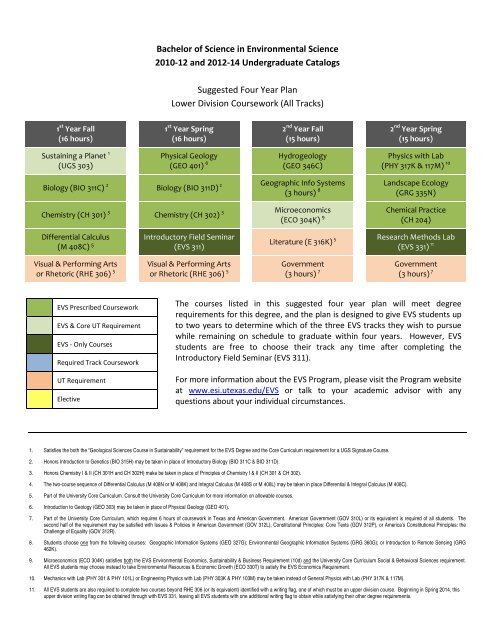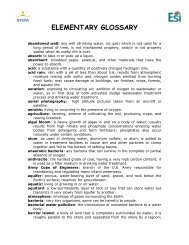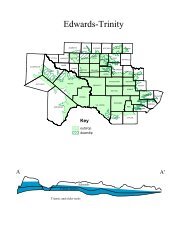sample four year plan - Environmental Science Institute
sample four year plan - Environmental Science Institute
sample four year plan - Environmental Science Institute
Create successful ePaper yourself
Turn your PDF publications into a flip-book with our unique Google optimized e-Paper software.
Bachelor of <strong>Science</strong> in <strong>Environmental</strong> <strong>Science</strong>2010-12 and 2012-14 Undergraduate CatalogsSuggested Four Year PlanLower Division Coursework (All Tracks)1 st Year Fall(16 hours)1 st Year Spring(16 hours)2 nd Year Fall(15 hours)2 nd Year Spring(15 hours)Sustaining a Planet 1(UGS 303)Physical Geology(GEO 401) 6Hydrogeology(GEO 346C)Physics with Lab(PHY 317K & 117M) 10Biology (BIO 311C) 2 Biology (BIO 311D) 2 Geographic Info SystemsLandscape Ecology(3 hours) 8 (GRG 335N)Chemistry (CH 301) 3 Chemistry (CH 302) 3 Microeconomics(ECO 304K) 9Chemical Practice(CH 204)Differential Calculus(M 408C) 5Introductory Field Seminar(EVS 311)Literature (E 316K) 5Research Methods Lab(EVS 331) 11Visual & Performing Artsor Rhetoric (RHE 306) 5Visual & Performing Artsor Rhetoric (RHE 306) 5GovernmentGovernment(3 hours) 7 (3 hours) 7EVS Prescribed CourseworkEVS & Core UT RequirementEVS - Only CoursesRequired Track CourseworkUT RequirementElectiveThe courses listed in this suggested <strong>four</strong> <strong>year</strong> <strong>plan</strong> will meet degreerequirements for this degree, and the <strong>plan</strong> is designed to give EVS students upto two <strong>year</strong>s to determine which of the three EVS tracks they wish to pursuewhile remaining on schedule to graduate within <strong>four</strong> <strong>year</strong>s. However, EVSstudents are free to choose their track any time after completing theIntroductory Field Seminar (EVS 311).For more information about the EVS Program, please visit the Program websiteat www.esi.utexas.edu/EVS or talk to your academic advisor with anyquestions about your individual circumstances.1. Satisfies the both the “Geological <strong>Science</strong>s Course in Sustainability” requirement for the EVS Degree and the Core Curriculum requirement for a UGS Signature Course.2. Honors Introduction to Genetics (BIO 315H) may be taken in place of Introductory Biology (BIO 311C & BIO 311D).3. Honors Chemistry I & II (CH 301H and CH 302H) make be taken in place of Principles of Chemistry I & II (CH 301 & CH 302).4. The two-course sequence of Differential Calculus (M 408N or M 408K) and Integral Calculus (M 408S or M 408L) may be taken in place Differential & Integral Calculus (M 408C).5. Part of the University Core Curriculum. Consult the University Core Curriculum for more information on allowable courses.6. Introduction to Geology (GEO 303) may be taken in place of Physical Geology (GEO 401).7. Part of the University Core Curriculum, which requires 6 hours of coursework in Texas and American Government. American Government (GOV 310L) or its equivalent is required of all students. Thesecond half of the requirement may be satisfied with Issues & Policies in American Government (GOV 312L), Constitutional Principles: Core Texts (GOV 312P), or America’s Constitutional Principles: theChallenge of Equality (GOV 312R).8. Students choose one from the following courses: Geographic Information Systems (GEO 327G); <strong>Environmental</strong> Geographic Information Systems (GRG 360G); or Introduction to Remote Sensing (GRG462K).9. Microeconomics (ECO 304K) satisfies both the EVS <strong>Environmental</strong> Economics, Sustainability & Business Requirement (10d) and the University Core Curriculum Social & Behavioral <strong>Science</strong>s requirement.All EVS students may choose instead to take <strong>Environmental</strong> Resources & Economic Growth (ECO 330T) to satisfy the EVS Economics Requirement.10. Mechanics with Lab (PHY 301 & PHY 101L) or Engineering Physics with Lab (PHY 303K & PHY 103M) may be taken instead of General Physics with Lab (PHY 317K & 117M).11. All EVS students are also required to complete two courses beyond RHE 306 (or its equivalent) identified with a writing flag, one of which must be an upper division course. Beginning in Spring 2014, thisupper division writing flag can be obtained through with EVS 331, leaving all EVS students with one additional writing flag to obtain while satisfying their other degree requirements.
Bachelor of <strong>Science</strong> in <strong>Environmental</strong> <strong>Science</strong>2010-12 and 2012-14 Undergraduate CatalogsGeological <strong>Science</strong>s Track (Jackson School of Geosciences)3 rd Year – Fall (16 hours) 3 rd Year – Spring (17 hours) 4 th Year – Fall (16 hours) 4 th Year – Spring (16 hours)Physics (PHY 317L & 117N) i Plate Tectonics (GEO 404C) Prof. Development (EVS 141) Prof. Communication (EVS 151)Multivariable Calculus (M 408D) Field Methods (GEO 420K) Senior Research (EVS 371) Ecology (BIO 373) vSedimentary Rocks (GEO 416M) Climate & Oceans (3 hours) ii Policy & Politics (3 hours) ii Ecology Field Lab (BIO 373L) vEarth Materials (GEO 416K) History (3 hours) iii Upper Division GEO (3 hours) Climate & Water (3 hours) iiElective (3 hours) iv Upper Division GEO (3 hours) Upper Division GEO (3 hours)History (3 hours) iii Elective (3 hours) ivBiological <strong>Science</strong>s Track (College of Natural <strong>Science</strong>s)3 rd Year – Fall (15-17 hours) 3 rd Year – Spring (15-17 hours) 4 th Year – Fall (16-17 hours) 4 th Year – Spring (16-17 hours)Foreign Lang/Cult (3-5 hours) vi Foreign Lang/Cult (3-5 hours) vi Prof. Development (EVS 141) Prof. Communication (EVS 151)Genetics (BIO 325) vii Conservation (3 hours) ii Senior Research (EVS 371) Policy & Politics (3 hours) iiClimate & Oceans (3 hours) ii Ecology (BIO 373) v Taxon Diversity (3-4 hours) ii Physio. & Neuro. (3-4 hours) iiHistory (3 hours) iii Ecology Field Lab (BIO 373L) v Evolution (BIO 370) Biostatistics (SSC 328M)Elective (3 hours) iv Elective (3 hours) iv History (3 hours) iii Elective (3 hours) ivElective (3 hours) iv Elective (3 hours) ivGeographical <strong>Science</strong>s Track (College of Liberal Arts)3 RD Year – Fall (15-17 hours) 3 rd Year – Spring (15-17 hours) 4 th Year – Fall (16 hours) 4 th Year –Spring (16 hours)Foreign Lang/Cult (3-5 hours) viii Foreign Lang/Cult (3-5 hours) viii Prof. Development (EVS 141) Prof. Communication (EVS 151)Natural Environ. (GRG 301C) A Changing World (GRG 304E) Senior Research (EVS 371) ix Policy & Politics (3 hours) iiGRG Course (3 hours) ii GRG Course (3 hours) ii CEHET (3 hours) x Social <strong>Science</strong> (3 hours) xiiClimate & Oceans (3 hours) ii Ecology (BIO 373) v GRG Course (3 hours) ii GRG Course (3 hours) iiHistory (3 hours) iii Ecology Field Lab (BIO 373L) v GRG or Elective (3 hours) xi GRG Course (3 hours) iiHistory (3 hours) iiiGRG or Elective (3 hours) xii. Electricity and Magnetism with Lab (PHY 316 & PHY 361L) or Engineering Physics II with Lab (PHY 303L & PHY 103N) may be taken instead of General Physics II with Lab (PHY 317L & PHY 117N).ii.iii.iv.Consult with your academic advisor visit the EVS Program Website at www.esi.utexas.edu/EVS (under Current Students) for a list of approved courses for this requirement.Part of the University Core Curriculum, which requires 6 hours of American History (3 of which may be in Texas History). Consult the University Core Curriculum for more information on allowable courses.Please consult your academic advisor about potential restrictions on what courses may count as electives towards your degree.v. Marine Ecology (MNS 320) with either Marine Ecology Lab (MNS 120L) or MNS 152T (Topic: Marine Ecology) may be taken in place of BIO 373 & 373L (Ecology & Ecology Lab). Note that MNS 320 may not be used to satisfy both the Climates& Oceans requirement and the Ecology requirement.vi. Please consult with your academic advisor for a list of approved foreign language and cultures courses. Note that the College of Natural <strong>Science</strong>s (Biology Track) is not identical to the approved list at the College of Liberal Arts (GeographyTrack) and courses for Biology Track students must be chosen from the Natural <strong>Science</strong>s list.vii. Honors genetic Honors Genetics (BIO 325H) can may be taken in place of Genetics (BIO 325) if the student took Honors Introduction to Genetics (BIO 315H ) in place of Introductory Biology (BIO 311C & BIO 311D).viii. Consult with your academic advisor visit the EVS Program Website at www.esi.utexas.edu/EVS (under Current Students) for a list of approved courses for this requirement. Students must use a lab or field course to satisfy either theirPhysiology & Neurology or Taxon-Based Diversity requirement, or they will need to take an additional field or lab course. Additionally, if a student completes one of these requirements by taking 3 hours (rather than <strong>four</strong>), an additional 1 hour ofelectives must be taken to complete the 126 hours required for the degree.ix. Please consult with your academic advisor for a list of approved foreign language and cultures courses. Note that the College of Liberal Arts (Geography Track) is not identical to the approved list at the College of Natural <strong>Science</strong>s (BiologyTrack) and courses for Geography Track students must be chosen from the Liberal Arts list.x. Students pursuing the Geography Track can take Field Techniques (GRG 373F) or Field Methods in Landscape Characterization (GRG 373K) instead of completing a Senior Research Experience.xi. A list of courses satisfying the Cultural Expression, Human Experience, and Thought (CEHET) requirement is available from the Geography academic advisor or on the College of Liberal Arts website.xii. The Geography Track requires students complete 30 hours of approved geography coursework, but students may use a course to satisfy both a Prescribed Requirement and this 30-hour requirement provided the course is approved for bothrequirements. The degree <strong>plan</strong> presents three opportunities for this to occur: (1) Geography Track students will complete 3 hours of their 30-hour requirement by taking Landscape Ecology (GRG 335N) as part of their Prescribed Requirements;(2) Geography Track students may complete another 3 hours of their 30-hour requirement by taking Climate Change (GRG 333K) or <strong>Environmental</strong> Change & Management of Large Rivers (GRG 356T) as their Prescribed Climates & OceanRequirement; and (3) Geography Track students may complete another 3 hours of their 30-hour requirement by taking <strong>Environmental</strong> Geographic Information Systems (GRG 360G) as their as Prescribed GIS Requirement or another 4 hours oftheir 30-hour requirement by taking Introduction to Remote Sensing (GRG 462K) as their as Prescribed GIS Requirement. Please note that permitting a course to count towards two requirements is an exceptionalxiii. The course taken to satisfy the College of Liberal Arts social science requirement must be from a field taught in the College of Liberal Arts and must be in a different field of study from the course used to fulfill the university core social sciencerequirement. Courses that satisfy the university social science requirement can satisfy the college requirement, and a list of additional courses that can satisfy the college requirement is available from the Geography academic advisor or on theCollege of Liberal Arts website. EVS students typically use Microeconomics (ECO 304K) to satisfy the university’s Core Curriculum Social <strong>Science</strong> requirement, therefore Geography Track students will need to complete a social science outsideof the field of Economics.










